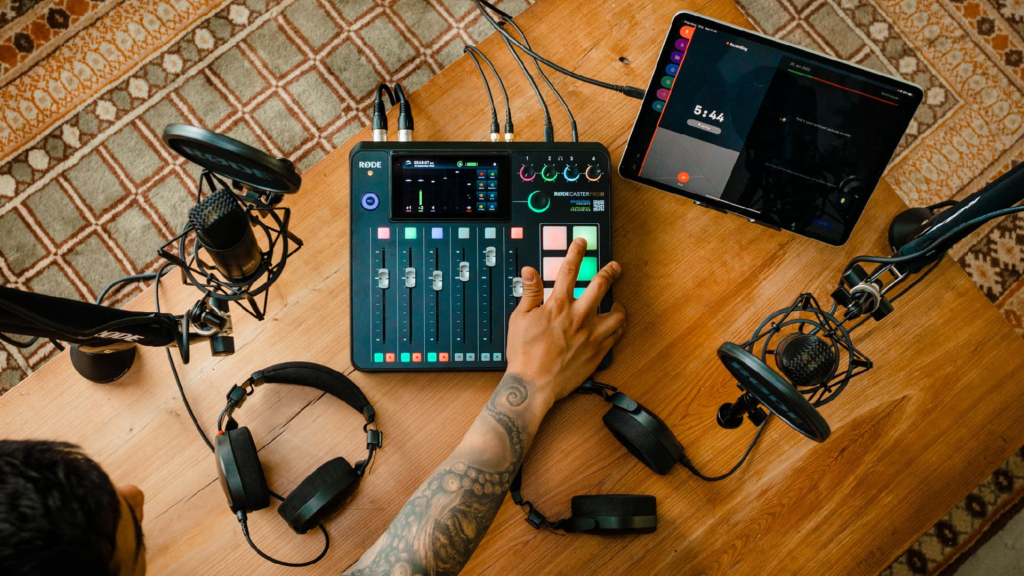Are you ready to make your voice heard and share your passion with the world? Podcasting is a powerful platform that allows you to connect with an audience, express your creativity, and establish yourself as an authority in your niche. Whether you’re a seasoned professional or a complete beginner, starting your own podcast can be an exciting journey filled with endless possibilities. Let’s dive into this step-by-step guide on how to launch your very own podcast and unleash your unique voice upon the digital airwaves!

Benefits of Starting a your Own Podcast
Podcasting offers a myriad of benefits for those looking to share their voice with the world. Starting a podcast allows you to connect with a global audience and build a community around your passion or expertise. It provides a platform where you can engage with listeners on a personal level, creating meaningful relationships and conversations.
Moreover, podcasts offer flexibility in content creation. You have the freedom to choose topics that resonate with you and your audience, without conforming to traditional media constraints. This creative autonomy opens up endless possibilities for exploring different themes and formats.

Additionally, podcasting can help establish you as an authority in your field. By consistently delivering valuable content, you position yourself as a trusted source of information within your niche. This credibility can lead to exciting opportunities such as collaborations, speaking engagements, or even monetization avenues.
Starting a podcast is not just about broadcasting your message – it’s about building connections, fostering creativity, and establishing yourself as an influential voice in the digital landscape.
Choosing a Topic and Niche for your Own Podcast
When starting your own podcast, choosing the right topic and niche is crucial for attracting and retaining listeners. Consider what you are passionate about or knowledgeable in – this will make it easier to create engaging content consistently.
Think about who your target audience is and what they would be interested in hearing. Research popular podcasts in your chosen niche to see what works well and how you can bring a unique angle to the table.
Remember that selecting a specific niche can help you stand out from the competition and attract a dedicated following. Don’t be afraid to get creative with your topic selection – the more niche, the better!
Ensure that your chosen topic is something you can speak passionately about week after week. This enthusiasm will shine through in your episodes and keep listeners coming back for more.
Equipment and Software Needed for your Own Podcast
When starting your own podcast, having the right equipment and software is essential to ensure a professional sound quality. Invest in a good microphone to capture clear audio – USB microphones are great for beginners. Next, consider getting headphones to monitor sound while recording.
A pop filter can help reduce unwanted noise from plosive sounds like “p” and “s”. Additionally, using recording software like Audacity or GarageBand can help you edit your episodes seamlessly. These tools allow you to cut out mistakes, add music or effects, and enhance overall production value.

Don’t forget about hosting platforms like Podbean or Libsyn where you can upload and distribute your episodes across different podcast directories. Consider creating cover art for your podcast which visually represents your show on platforms like Apple Podcasts or Spotify.
Structuring Your Episodes for your Own Podcast
When it comes to structuring your podcast episodes, organization is key. Start by outlining the main points you want to cover in each episode. This will help keep your content focused and on track.
Consider starting with a hook or introduction that grabs the listener’s attention right from the beginning. This could be a personal anecdote, an interesting fact, or a thought-provoking question.
Once you’ve hooked your audience, dive into the meat of your episode. Break down your main points into digestible segments to make it easier for listeners to follow along.
Don’t forget to include transitions between segments to keep the flow smooth and cohesive. This can be as simple as a quick summary or teaser of what’s coming up next.
Wrap up each episode with a strong conclusion that ties everything together. Leave your listeners with something memorable to take away from the episode.
Recording and Editing Your Podcast
When it comes to recording and editing your podcast, having the right tools is crucial. Invest in a good quality microphone to ensure clear audio for your listeners. There are many affordable options available that still deliver professional sound.
Choose a quiet space to record where you won’t be interrupted by background noise. Consider using headphones while recording to monitor your audio levels and make any necessary adjustments on the spot.
Editing is where you can really polish your podcast episodes. Use editing software like Audacity or GarageBand to fine-tune your recordings, remove any mistakes or pauses, and add in music or sound effects if desired.
Don’t be afraid to experiment with different editing techniques to find what works best for your style. Remember, practice makes perfect when it comes to creating high-quality content for your audience.
Publishing and Promoting Your Podcast
Once your podcast episodes are ready, it’s time to get them out into the world. Publishing your podcast involves choosing a hosting platform where you can upload your episodes. There are several options available like Podbean, Buzzsprout, or Libsyn, each offering different features and pricing plans.
After uploading your episodes to the hosting platform, you’ll need to submit your podcast feed to directories such as Apple Podcasts, Spotify, Google Podcasts, and Stitcher. This step is crucial for reaching a wider audience as these directories make it easier for listeners to find and subscribe to your show.
Promoting your podcast is key to growing your listener base. Share new episodes on social media platforms like Instagram, Twitter, Facebook, and LinkedIn. Consider creating audiograms or teaser clips to generate interest and attract new listeners.
Engage with your audience by responding to comments and messages. Collaborate with other podcasters in similar niches for cross-promotion opportunities. Don’t forget about SEO – optimize episode titles and descriptions with relevant keywords so that potential listeners can easily discover your content.
By consistently publishing high-quality content and actively promoting it across various channels, you’ll increase visibility and build a loyal listener following over time.
Monetizing Your Podcast
Once you have established your podcast and built a loyal audience, you may be wondering how to monetize your content. There are several strategies you can explore to generate income from your podcast.
One common method is through sponsorships and advertisements. By partnering with relevant brands or companies, you can integrate sponsored content into your episodes in exchange for payment.
Another way to monetize your podcast is through affiliate marketing. By promoting products or services and earning a commission on any sales generated through your unique referral link, you can create an additional revenue stream.
You could also consider offering premium content or exclusive bonus episodes to listeners who subscribe to a paid membership. This not only provides value to your dedicated fans but also generates recurring income for your podcast.
Don’t forget about merchandising opportunities! Creating branded merchandise such as t-shirts, mugs, or stickers can be a fun way to engage with your audience while also generating some extra revenue.
Common Challenges and How to Overcome Them
When starting your own podcast, you may encounter common challenges that could potentially hinder your progress. One challenge many podcasters face is finding their unique voice and standing out in a crowded market. To overcome this, focus on what sets you apart from others and be authentic in your content.
Technical issues like sound quality or editing can also pose difficulties for beginners. Invest in good equipment and take time to learn how to use editing software effectively. Consistency is key when it comes to recording and releasing episodes regularly.

Another hurdle could be promoting your podcast and growing your audience. Utilize social media platforms, collaborate with other creators, and engage with listeners for organic growth. Remember that building a community takes time but staying dedicated will pay off in the long run.
Don’t let self-doubt or fear of failure hold you back. Embrace the learning process, seek feedback from listeners, and continuously improve based on constructive criticism. By facing these challenges head-on with determination and perseverance, you’ll pave the way for podcasting success!
Conclusion
Starting your own podcast can be an exciting and rewarding journey. With the right equipment, software, and a clear understanding of your niche, you can create engaging content that resonates with your audience. Remember to structure your episodes effectively, put effort into recording and editing, and promote your podcast across various platforms.
While challenges may arise along the way, such as technical issues or finding a consistent schedule, these obstacles can be overcome with perseverance and dedication. By monetizing your podcast through sponsorships, merchandise sales, or other avenues, you can turn your passion into a sustainable venture.
So if you’ve been thinking about launching a podcast but weren’t sure where to start – now is the time to take action! Follow this step-by-step guide to embark on an exciting podcasting journey and share your unique voice with the world. Happy podcasting!
For more such content, please check out QAWire


